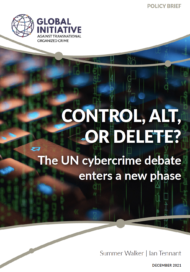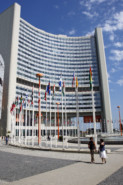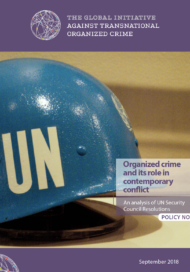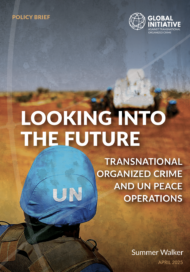Posted on 21 Dec 2017
The decades ahead portend significant technological, physical and social change. A recent study by the UN University concludes that these changes will challenge the central role of states as sources of protection and empower organized crime. This will pose a fundamental challenge for state-based politics, global governance and the UN.
Over the next three decades, according to the study, some states – overwhelmed by the impacts of climate change, economic disruptions caused by big data and artificial intelligence, and cyber threats – may struggle to protect their people. Non-state governance providers, including criminal actors, will step into this security vacuum, providing, in return for profit, protection and risk-reduction services, dictating new kinds of norms and offering meaning and identity to citizens. People are already beginning to look beyond the state to the gang, the tribe, the umma as alternative sources of governmentality.
A rise in organized crime will drive corruption in state governance. States that are fragile today may become crooked tomorrow, serving the interests of a corrupt elite while leaving swathes of the population vulnerable to environmental, economic and health insecurity. By 2050, the lines between public and private will become blurred, and corruption risks becoming the operating system of governance in many contexts, particularly in places affected by conflict.
Given these challenges, what is the UN – a system of governance that promotes responsible statehood as the cure-all for conflict, climate change and economic instability – to do?
Organized crime as an unintended consequence of global policy choices
Organized-crime groups have long provided services that governments do not – such as trafficking drugs and arms, domestic assassination, extortion and money laundering. As the climate, the labour market, the population and even money systems change in the years ahead, organized crime will step in to exploit vulnerabilities generated by global policy choices.
Take migration, where the absence of safe, regular and orderly migration routes compels migrants to hire criminal brokers. In Central America, because states don’t support migrants in their quest for sustainable livelihoods, migrants are forced to rely on organized-crime groups for their passage to their destinations and for protection en route. The story is similar in Libya, where migrants risk enslavement and torture. Without more effective global governance, these irregular markets will continue to grow. Ageing populations in Europe, East Asia, North America and the Gulf, plus youth bulges in sub-Saharan Africa and South Asia, mean that irregular migration – under corrupt political patronage – is here to stay.
The story is the same across many markets and value chains. For example, criminal-political networks are at the core of illegal wildlife trafficking in Africa and control water mafias in South Asia. Rapid urbanization will exacerbate resource scarcity and governance challenges, meaning the incursion of criminal groups into security services – as seen in the favelas of Rio de Janeiro – will become more widespread.
Automation and artificial intelligence may swell unemployment and hence create further vulnerabilities that states will struggle to address, as large numbers of people – especially youth – may be left searching for livelihoods and increasingly turn to organized crime.
As more and more people come online, vulnerabilities are rapidly emerging in cyberspace. Recent attacks have disrupted health systems, stolen huge sums from international banking systems and influenced elections. States may attempt to provide exclusive cyber protection by controlling access to parts of cyberspace, as China has tried to do with its Great Firewall. These new cyber borders, like their physical counterparts, will be sites of corruption and criminal influence. Some states will look to those with criminal expertise to augment their cyber capabilities, either through informal alliances or by licensing ‘authorized’ hackers – as a draft bill in Singapore has recently proposed.
An existential problem for the UN?
The risk that some of the UN’s own member states may become ‘crooked’ – through the rise of global organized crime and corruption, and the emergence of these new vulnerabilities – poses a threat to the very legitimacy of the organization and its aims. The UN must carefully consider how it can counter corrupt criminal influence in its member states, given that its mandates are drawn from these countries.
The UN’s current responses to organized crime are largely technical: they aim to equip UN entities to help states develop specific operational capabilities to deal with organized crime. Slowly but surely, the UN is learning how to crime-proof conflict management. It now offers significant support to states to help them develop cybercrime response capabilities. And it has even experimented with supporting local investigation and prosecution efforts to root out the influence of organized crime from government.
Going forward, the UN has to acknowledge the political power of organized crime. It must take a more strategic approach, identifying the drivers of organized crime, and put in place measures that will, over time, delegitimize the role of crime in governance. Global public policies must address the vulnerabilities, outlined above, that people will face over the coming decades and win back support for the state. This means helping states build resilient communities that offer people protection, meaning and hope. Through Agenda 2030 and its work on peace and security, the UN is uniquely positioned to play that role. The technical approach to the UN’s current work on organized crime must be replaced by a more overtly normative and strategic one, with greater emphasis on communication by senior UN leaders. This means standing up against organized crime – and weathering the backlash from some states.
Confronting organized crime and undermining its power will help ensure a fair and just rules-based international order in the years ahead. Failure to do so would lead to the decline of the very concept of the state and threaten the prosperity of a global future.



